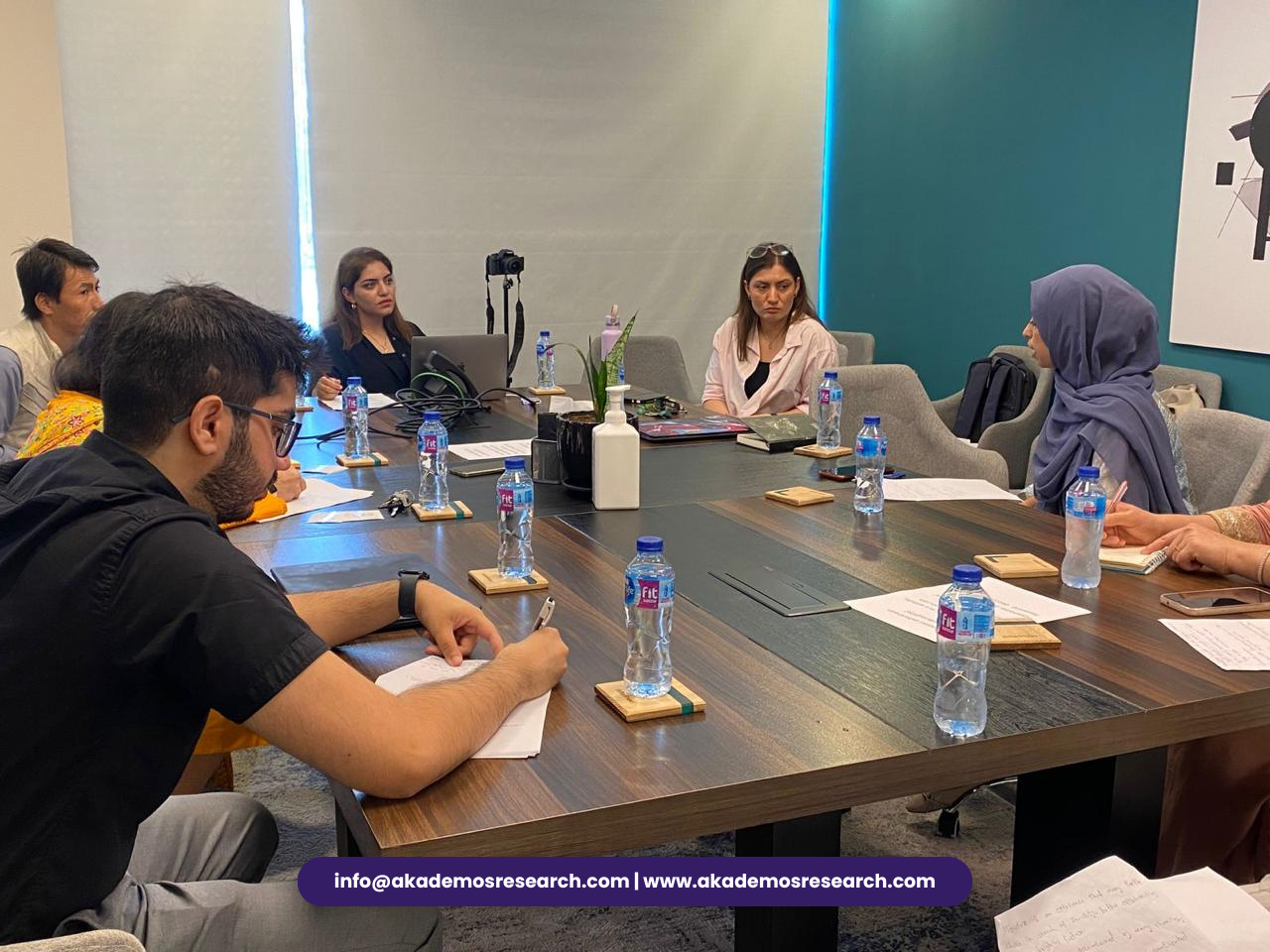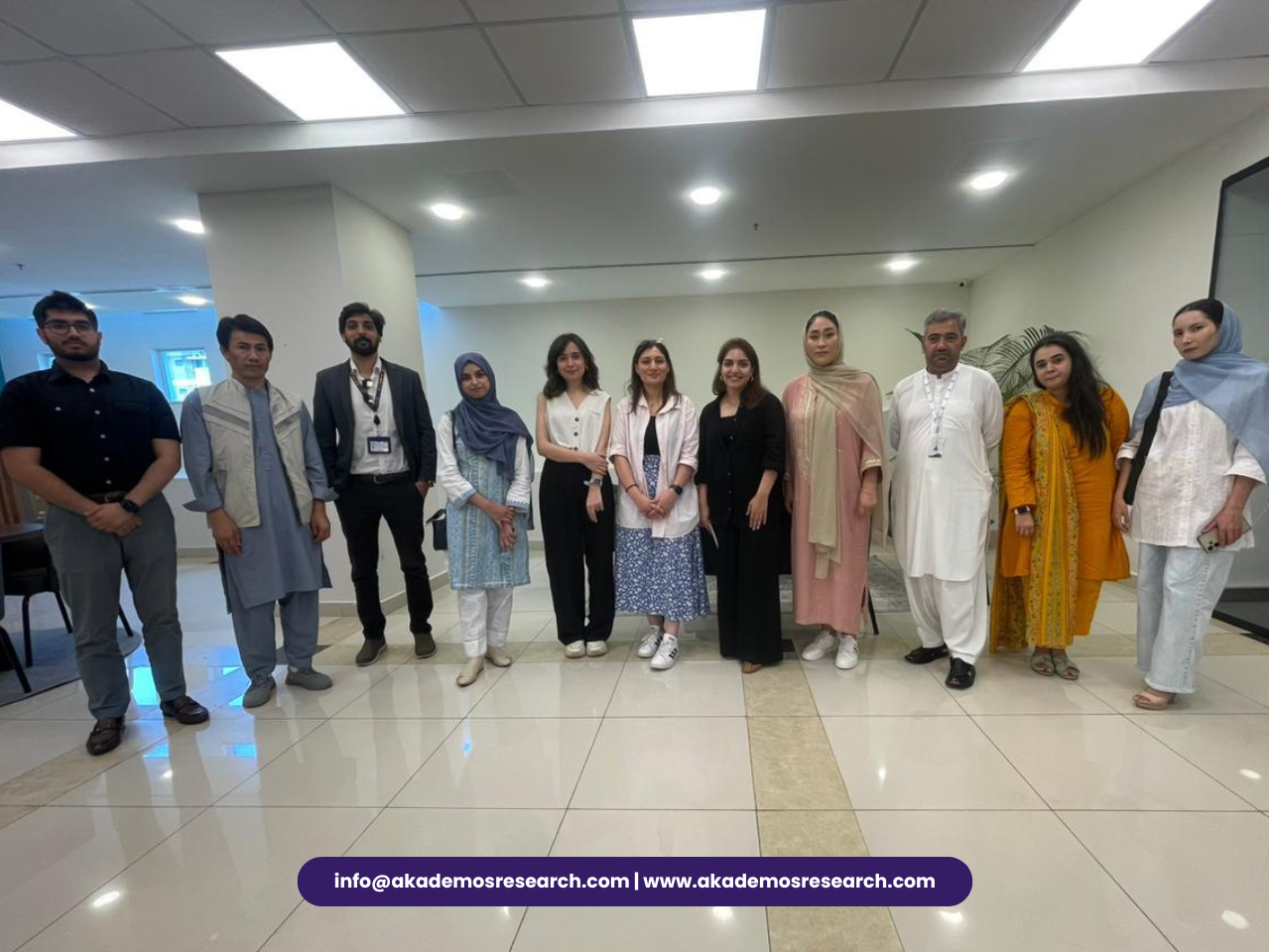Digital Solutions for Refugees with School of Leadership Foundation (SoLF) and UNFPA
Date: 29 Aug, 2024
Introduction
Pakistan is home to one of the world's largest refugee populations. In 2024, Akademos partnered up with the School of Leadership Foundation (SoLF) and UNFPA to explore new strategies for meeting the critical needs of refugees and their host communities. The School of Leadership Foundation (SoLF), a leading Pakistani organization, focuses on human capital development, while UNFPA is a global leader in reproductive health, rights, and population development.
Project Objectives

The global refugee crisis is a complex humanitarian challenge, with Pakistan bearing a disproportionate burden. The influx of over 3.1 million Afghan refugees has exacerbated socioeconomic challenges, particularly in Khyber Pakhtunkhwa, Punjab, Balochistan, and Islamabad. Refugees often lack basic amenities and are disproportionately vulnerable to Gender-Based Violence (GBV) and Sexual Reproductive Health (SRH) issues. Despite receiving assistance from various organizations, funding remains inadequate, leaving gaps in critical support areas for these vulnerable groups.
To address the challenges refugees and host communities face, the School of Leadership Foundation (SoLF), in partnership with the United Nations Population Fund (UNFPA), is developing a digital platform. SoLF conducted a comprehensive feasibility study with Akademos to assess the potential of this digital innovation lab. The lab, envisioned as a digital platform, would provide tools, skills training, and support services, including those related to gender-based violence and sexual reproductive health.
This project aimed to determine refugees' interest in digital learning and entrepreneurship and recognize the struggles they come across in Pakistan, including restricted access to financial services and commercial prospects. The project's goal was to guide the creation of an innovation lab that might successfully assist refugees in creating sustainable livelihoods by recognizing unique needs and possible drawbacks such as lack of bank accounts or legal status.
Methodology
Akademos conducted in-depth research to identify needs, develop a detailed project plan, and prepare a solid lab development foundation.
- Desk Research & Methodology:
- Tool Development and Data Collection Instruments:
- Focus Group Discussions:
- Data Analysis :
Leveraging secondary data sources, a detailed desk research was executed to understand the refugee issue in Pakistan. This involved an in-depth examination of academic studies, policy papers, reports from NGOs and government agencies, and relevant statistical data. The analysis illuminated historical trends, current conditions, and appropriate policy frameworks, providing a robust beginning for the research. A Random Stratified Sampling strategy was implemented, dividing the sample into strata based on geographic location, age, and gender.
Two primary survey instruments were developed: one for refugees and another for non-refugee populations. These surveys incorporated a mix of closed-ended and open-ended questions to capture quantitative and qualitative data. Additionally, a semi-structured guide for focus group discussions was created to allow for in-depth exploration of key themes. The main areas covered in the refugee survey included demographics, living conditions, access to services, education, employment, and aspirations. The host community survey focused on perceptions of refugees, resource sharing, and potential areas of collaboration.
Four focus group discussions were conducted in Balochistan, Khyber Pakhtunkhwa, Punjab, and the federal territory to gather in-depth qualitative data. Participants were selected through snowball sampling to ensure a diverse representation of the community. FGDs included male and female participants focused on education, healthcare, employment, social integration, community perceptions regarding refugees, and the potential for a digital platform.
The collected data was analyzed using statistical and thematic methods to identify patterns and trends. The findings were presented through an interactive PoweBI dashboard.
Challenges
The project faced hurdles in reaching and engaging refugee populations due to factors such as ongoing repatriation, police harassment, and trust issues. Akademos mitigated these concerns by utilizing innovative sampling techniques and employing experienced enumerators with prior refugee community experience to navigate these difficulties. Separate focus group discussions were conducted for male and female respondents in specific locations based on participant preferences for better authenticity and comfort.
Key Findings:

- Entrepreneurial Aspirations and Challenges:
- Access to Technology and Digital Platforms:
- Gender-Based Violence (GBV) and Sexual Reproductive Health (SRH):
- Challenges with Citizenship and Legal Status:
- Community Support and Integration:
A strong entrepreneurial spirit was evident amongst the refugees, particularly in technology, retail, and small-scale manufacturing. However, access to funding, legal challenges, and an absence of business support posed as constraints.
While most respondents owned smartphones and were regular internet users, their financial situation limited their access to paid online educational platforms.
Women and adolescent girls, in particular, exhibited a lack of awareness and education regarding gender-based violence (GBV) and sexual reproductive health (SRH). Cultural stigmas and fear of retaliation hindered open discussions on these sensitive topics.
Citizenship and legal recognition emerged as a critical barrier, with over 80% of respondents indicating that the lack of legal status hindered their ability to access basic services and secure formal employment. This created a void for those wishing to start businesses, as the absence of recognized identification or business licenses made it nearly impossible to operate within the formal economy.
Community support networks were crucial for helping refugees overcome daily challenges. Perceptions of integration varied significantly, with non-refugees believing refugees had integrated well into society, while refugees reported otherwise. Non-refugee respondents acknowledged the entrepreneurial potential of refugees but highlighted the substantial obstacles they faced in accessing social services, legal assistance, and funding.
Findings from Stakeholder Focus Group Discussions
Stakeholder focus groups revealed the primary limitations refugees must overcome, including restricted access to financial resources, trauma care, language services, mentorship, sustainable livelihood opportunities, and essential skills training. The scarcity of mobile SIM cards and variations in digital access across income brackets were also significant challenges. The sensitive nature of GBV and SRH subjects and a general lack of knowledge further exacerbated the hardships faced by the refugee population.
Future Potential & Possible Steps
Akademos' research unveiled a strong appetite among refugees to establish their businesses. While interest in entrepreneurship was prevalent, participants expressed a clear need for dedicated support systems to navigate the complexities of starting companies.
The study revealed a vacuum in the availability of resources specifically for refugee entrepreneurs. Although the current platforms assisted, they frequently failed to cater to this demographic's needs.
Furthermore, the research showcased the importance of tackling social and cultural factors, such as gender-based violence, sexual and reproductive health, and limited citizenship rights, which greatly impact the overall well-being and economic opportunities of refugees.
The suggested Innovation Lab presents a viable strategy to address noted issues in partnership with SoLF and UNFPA. By offering specialized training and resources, the project can empower refugees, promote resilience, and aid in their development.




